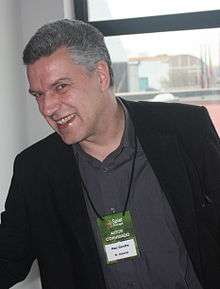Mac Gerdts
Walther M. Gerdts, known as Mac Gerdts, is the designer of German-style board games such as Imperial, Imperial 2030, Antike and Hamburgum. His games introduced the concept of a rondel rather than dice as a mechanism for play.[1] This is designed to prevent players from repeatedly taking the same action in quick succession without paying a cost.[2]

Mac Gerdts alla convention Play 2012, Modena
Like many German board games, all of Gerdts' games include a mechanism designed to keep game length roughly within the specified time constraint. In Imperial, the game ends when a nation reaches the 25 point on the counting chart. In Hamburgum, the game ends when six churches are constructed.
Games
- Antike, released in 2005, is about evolution and competition among ancient civilizations.
- Imperial, a 2006 game, has the players take on the roles of international investors in pre-World War I Europe.
- Hamburgum, released in 2007, is a game in which the object is to trade goods and make prestigious church donations. The spaces on the rondel are Church, Trade, Cloth, Guildhall, Beer, Dockyard, and Sugar.
- The Princes of Machu Picchu, released in 2008
- Imperial 2030, released in 2009, is a follow-up of Imperial, where USA, Europe, Russia, China, India and Brazil compete for world domination.
- Navegador, released in 2010, is a game about the Golden Age of Portuguese Explorations.
- Antike Duellum, released in 2012, is a two-player version of Antike.
- Concordia, a game released in 2013, about economics during the Roman Empire, is one of Mac's few games that does not employ a rondel. It was nominated for the 2014 Spiel des Jahres prize in the category Kennerspiel des Jahres (Connoisseur-Enthusiast Game of the Year).[3]
- Antike II, released in 2014, is the follow-up of Antike, modified to make conquests easier while also allowing players to have possibilities of winning without necessarily attacking other players.
- Transatlantic, a historic/economic game about industry exploration and naval transportation was presented at Essen Spiel 2014 and released in 2017.
gollark: C.
gollark: C++.
gollark: <@113673208296636420> Responsibilities outside of SC? Crazy.
gollark: If they are ACTUAL diamond blocks I'll buy them at a price which is actually good.
gollark: "Diamond blocks" or diamond blocks?
References
- Olson, Jeremy (August 19, 2016). "Mac Gerdts for President". Albany Times Union. Retrieved October 31, 2016.
- Boardgame News Archived 2008-05-01 at the Wayback Machine
- http://www.spieldesjahres.de/cms/front_content.php?idcatart=1236&id=875
External links
- Walther "Mac" Gerdts at Eggertspiele.de at the Wayback Machine (archived 2008-05-12)
- Mac Gerdts at BoardGameGeek

This article is issued from Wikipedia. The text is licensed under Creative Commons - Attribution - Sharealike. Additional terms may apply for the media files.